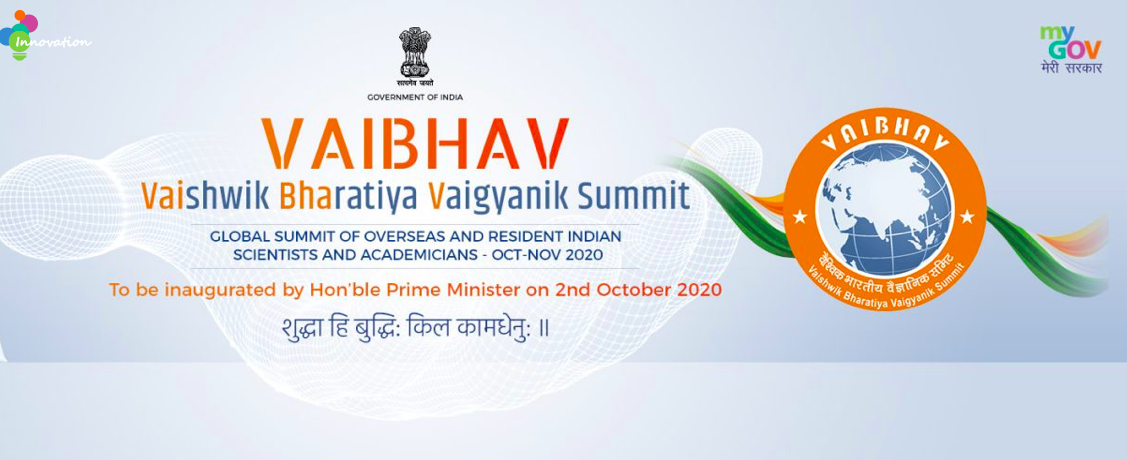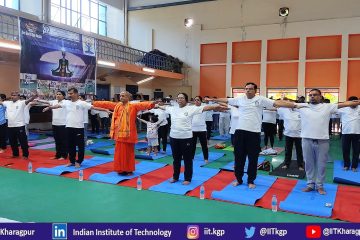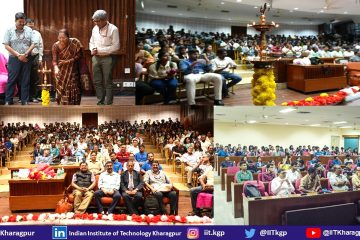IIT Kharagpur to lead High-Performance Computing, Internet of Things, Agro Economy and Food Security at Govt. of India’s VAIBHAV Summit.

Vaishwik Bharatiya Vaigyanik (VAIBHAV) Summit, a global summit of overseas and resident Indian scientists and academicians are being organized by the various science & technology and academic organizations under the Govt. of India. The Summit, which will be launched by the Prime Minister of India, Shri Narendra Modi on October 2, 2020, (0630 PM IST), aims to enable deliberations on thought processes, practices and R&D culture with a problem-solving approach for well-defined objectives. IIT Kharagpur has been selected to champion the verticals of ‘Communication Technology’ and ‘Computational Sciences’ both pertaining to the domain of Electrical Sciences and ‘Agro Economy and Food Security’.
Under the first two verticals, the Institute is organizing two horizontal sessions namely
1) High-performance computing and its application and
2) Internet of Things: Integrating Sensing, Communication and Computing All Together.
The initiative will be led by Prof. Niloy Ganguly and Prof. Pralay Mitra from the Dept. of Computer Science and Engineering.
High-performance computing (HPC) architecture is developed through a high-speed network of multiple computer servers. Therefore, HPC, utilizing its multiple computing resources, delivers a facility to solve a variety of scientific and engineering problems that could otherwise be difficult to solve using a desktop computer. In research and development, HPC allows performing concurrent jobs in parallel to speed up the computation.
“Under this horizontal, we wish to discuss the recent developments of HPC architectures and how efficiently these can be utilized to solve the cutting-edge computational problems. In recent times HPC has enabled the development of various fields including system biology, machine learning, large-scale real-life model simulation studies and the application in turn has helped in optimizing the HPC architecture. In this session, we would like to discuss this two-way flow and the challenges which need to be tackled thereby,” explained Prof. Pralay Mitra who will be chairing the session.
The other vertical of ‘Communication Technologies’ revolves around the concept of “Connected World” which has now become a reality than a concept with millions of devices controlling our daily lives and activities. Internet of Things (IoT) is not only confined within the sensing devices anymore, rather it spans to any ubiquitous system sharing and triggering the data of the Internet and participating in intelligent control and decision-making processes. In recent times, devices have become intelligent enough to support sensing, communication as well as the processing of the information, even in a battery-less setting. Considering the widespread applications of IoT in our day to day lives, it would be interesting to explore the technology through all its verticals, starting from sensing, communication, computation along with the security of information.
“Our session on Internet of Things will specially aim at discussing the challenges pertaining to convergence of communication, computing and sensing and the possibility the technology holds in developing the Indian industry,” said Prof. Ganguly.
This session will be chaired by Prof. Sandip Chakraborty from the department.
The third vertical led by Prof. Rintu Banerjee and Prof. D. K. Swain from the Dept of Agricultural & Food Engineering will cover the horizontal segments:
- Precision Agriculture: ICT and Big-Data Analytics for Empowerment of Stakeholders
- Application of Nanotechnology in Food/Feed Processing and Metabolic Biology of Food
Information and Communication Technology (ICT) is an emerging field focusing on the enhancement of agricultural production and rural development in India. It enables the dissemination of the essential information to the farmers at the right time, when combined with the power of Big-Data. ICT and Big-Data Analytics have the needed potential to revolutionize the accessibility of its stakeholders to the variety of agricultural information in an effective manner. Such information-rich farmers are thus empowered to make appropriate decisions to increase their yields and reduce economic losses due to the prevailing uncertainties. Under this sub-horizontal, we wish to discuss the recent advances in machine learning, deep learning, and AI; Decision support system and modeling; E-advisories and mobile technologies; and the Traceability from farm-to-fork. The lead faculty members of IIT Kharagpur are Prof. Peeysh Soni and Prof. Rajendra Machavaram.
“In this session, we will ponder on the technological, methodological as well as logistics-related challenges in the context of Indian agriculture; while also discussing appropriate strategies to leverage from ICT and Big-Data Analytics in overcoming those challenges,” remarked Prof.Banerjee.
The researchers will also explore nanotechnology which, over the past few decades, has been recognized as an attractive and alternative technology that has brought a revolution in food research. Being the technology at the atomic scale, the pre-designed and designated molecules have created a revolution in food applications. Because of its inimitable properties, the entire performance of nanotechnology in the food sector can be broadly divided into nanostructure-food ingredients and food nanosensing. The nanostructure elements are involved in food packaging, such as anticaking, humectants, stabilizer, leaving agents etc. On the contrary, any living system upon food intake response differently because of the complex metabolic stimulation where several metabolic cascades are functioning simultaneously. Upon ingestion of bioactive molecules such as phenolics, alkaloids or other phytochemicals, these biomolecules render some extra added defense response to the body, to fight against biotic and abiotic stresses.
“After COVID 19 pandemic, it is a well-established fact that the phytochemicals are undoubtedly participating in increased body immunity and thus it is an interesting area of research to scientifically establish the role of different phytochemicals and analogous molecules on disease prevention and enhancing body immunity. Thus this area of research has been felt extremely appropriate for today’s era for considering the latest happening on food and health care sectors,” added Prof. Banerjee.
VAIBHAV SUMMIT 2020 is that platform where the expert from India and NRIs working in these areas will be participating in the discussion, where the inevitable hurdles and their concomitant solutions will be discussed. In all sessions on eighteen verticals will be presented at the summit.
Ron (Ranbir) Gupta, a US-based alumnus of IIT Kharagpur from the 1970 batch will be talking at the inaugural session on October 2. Ron will throw light at the developments in the area of agritech and other rural technologies. He will further talk about his expert area, infrastructure.
For more information visit: https://innovate.mygov.in/vaibhav-summit/#tab1
Program Details:
Date: October 4, 2020, Time: 06.30 – 09.30 PM IST
Topic: High-performance computing and its application
Vertical: Computational Sciences
Speakers:
Prof. V. Bhavsar- Univ. Of New Brunswick
Prof. Preetam Ghose- Virginia Commonwealth University
Prof. Anil Vullikanti – University of Virginia
Prof. Ananth Kalyanaraman- Washington State University
Prof. Chirag Patel – Harvard University
Prof. Debnath Pal – IISC, Bangalore
Prof. Soumyendu Raha- IISC, Bangalore
Prof. Anshumali Shrivastava- Rice University
Prof. Pramod Batotia- TU Munich
Prof. Subhajyoti De- Rutgers University
Prof. Srinivas Aluru- Georgia Institute of Technology
Prof. Pralay Mitra – IIT Kharagpur
Prof. Somnath Roy- IIT Kharagpur
Prof. Niloy Ganguly- IIT Kharagpur
Date: October 7, 2020, Time: 05.00 – 08.00 PM IST
Topic: Precision Agriculture: ICT and Big-Data Analytics for Empowerment of Stakeholders
Vertical: Agro-Economics and Food Security
Speakers:
Prof. Nitin Kumar Tripathi – AIT Bangkok, Thailand
Prof. Narendra Kumar Ahuja – Uni. Illinois, US
Dr. Manzul Kumar Hazarika – Geoinformatics Center, AIT, Thailand
Dr. Lav R. Khot – WSU, US
Dr. Sindhuja Sankaran – WSU, US
Prof. J. Adinarayana – IIT Bombay
Prof. Prabir K. Biswas – IIT Kharagpur
Prof. Mahua Bhattacharya – ABV IIITM, Gwalior
Prof. Dharmesh K. Saxena – SLIET, Longowal, Punjab
Date: October 13, 2020, Time: 06.30 – 08.30 PM IST
Topic: Internet of Things: Integrating Sensing, Communication and Computing All Together
Vertical: Communication Technologies
Speakers:
Prof. P. R. Kumar- Texas A&M University
Archan Misra – SMU
Aruna Balasubramanium- Stony Brooks
Nishanth Shastry- University of Surrey
Ranga Rao Venkatesha Prasad- Delft University
Nirupam Roy- Maryland University
Niloy Ganguly – IIT Kharagpur
Sandip Chakraborty- IIT Kharagpur
Pralay Mitra- IIT Kharagpur
Bhaskaran Raman- IIT Bombay
Dr K Mourougayene- SAMEER
Date: October 16, 2020, Time: 08.30 – 11.30 PM IST
Topic: Internet of Things: Application of Nanotechnology in Food/Feed Processing and Metabolic Biology of Food
Vertical: Agro Economics and Food Security
Speakers:
Prof. Rabibrata Mukherjee, IIT Kharagpur
Prof. Rekha S. Singhal, ICT Mumbai
Prof. Sunil Kumar Khare, IIT delhi
Prof. Vasudeva Singh, Guwahati University
Prof. Anubhab Pratap Singh, University of British Columbia, Canada
Prof. Kalidas Shetty, North Dakota State University
Prof Keshavan Niranjan, University of Reading
Prof. Arun K. Bhuni, Purdue University



